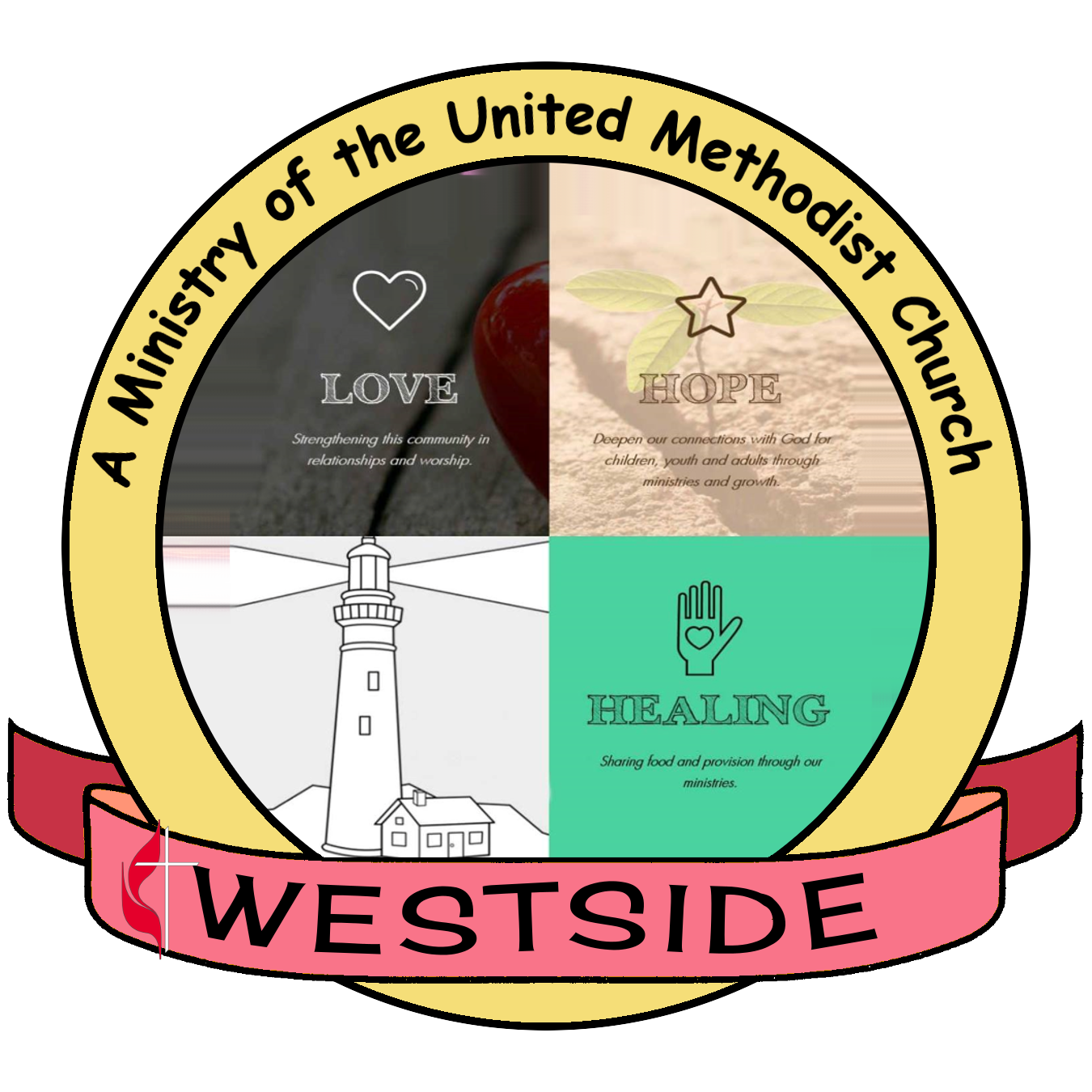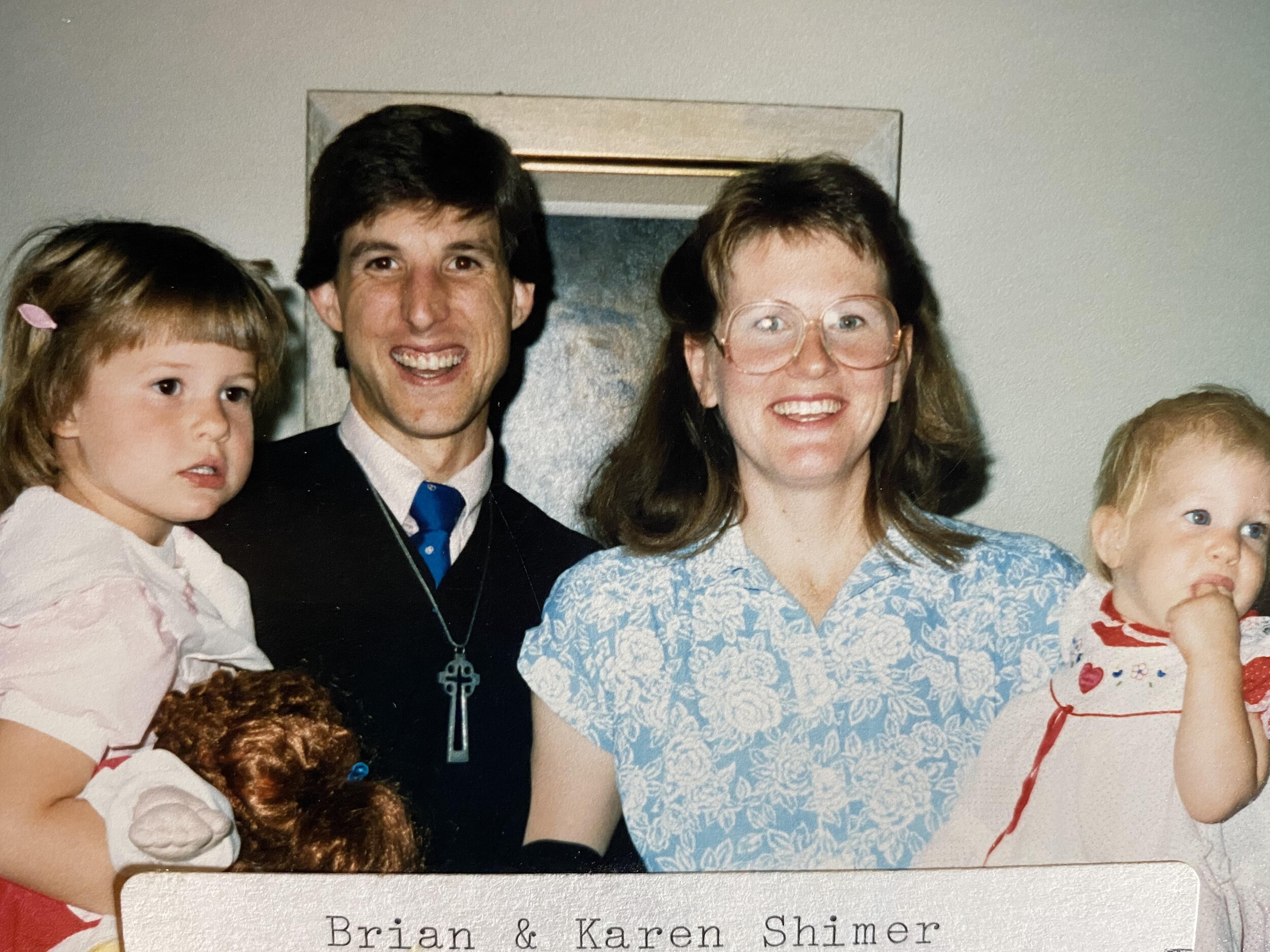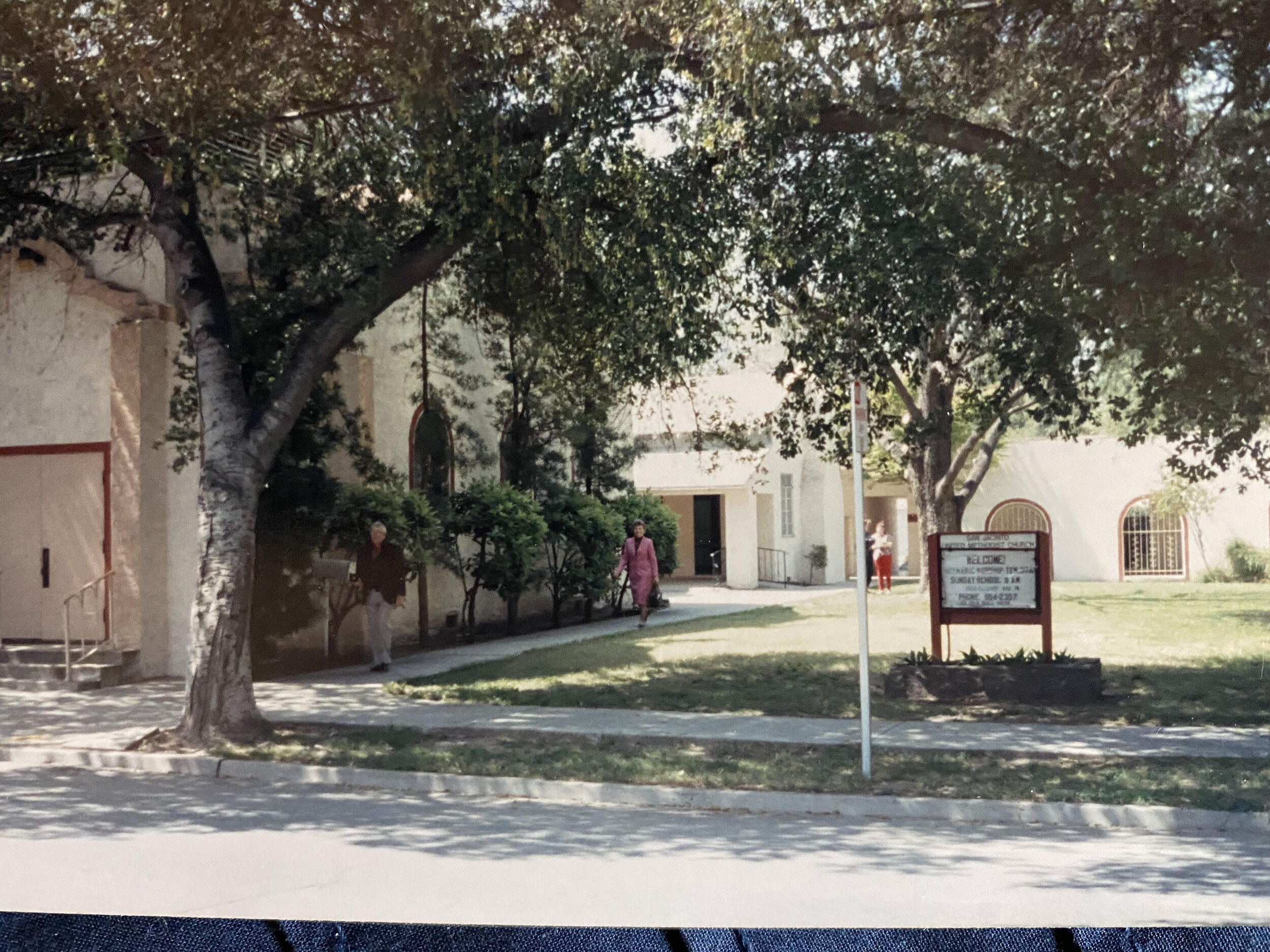San Jacinto UMC July 1, 1988 - June 30, 1994
Karen and I, with Anna (3) and Grace (1) in their carseats, drove for four days, in blistering heat, from Kentucky across the country to Southern California. We put a bucket of ice on the floor under Karen’s feet, opened all four windows and the air would circulate over that ice and get cooled a bit. Soon the ice melted, then, we’d dip bandanas into the ice water and tie them around our necks, and we’d fill our hats with ice and wear them on our heads so water could melt all over us. At around 8 in the morning, we turned off I-10 onto California 79 and began a winding drive down through Lambs Canyon into the San Jacinto valley. As we rounded a corner, the valley opened up before us. It looked like an agricultural checkerboard to me. A mini San Joaquin Valley, the Big Valley of California, where I had grown up. It looked inviting to me, exciting, and was a bit unnerving. But to Karen, it looked like a desert, which it technically was; she burst into tears, “I cannot live here.”
The folk we had spoken with before moving had told her that the San Jacinto Valley was lush and green, and full of vegetation. But Karen is an Oregon girl, and she pictured Multnomah Falls and the green of Oregon. What she saw was a dismal, dry place opening up to her, felt like an impossible burden.
For months after this she would say, “There’s something wrong with the sky here.”
It took awhile but one day she called me at the office saying, “I figured it out!”
“What’s that?” I asked.
“I figured out what’s wrong with the sky here,” she said.
“Oh, right. What is wrong with the sky here?”
“There are no clouds!” She exclaimed.
Indeed, for several months in San Jacinto, there had not been one cloud in the sky.
We arrived at the parsonage a couple hours early that first morning, and Nita the current pastor, answered the door, a towel around her head and said, “You are just too early, come back later,” and closed the door.
Welcome to town, Pastor Brian.
We drove around the area, found the church building a mile from the parsonage, eventually met up with Pastor Nita later and then met Helen Reeder. Helen took us under her wing, like lost chicks from her flock. She and her husband Harold had a little cottage behind their place where we stayed off and on for a few weeks until the parsonage was ready. The next night was our first time to meet with the SPRC -- the local HR team of the church. The group met with both Karen and I and the children. After they had been speaking with me, Maxine Divine turned to Karen and asked her, “What do you see as your role alongside of Brian in his pastorate?”
Just before that point in time, Grace needed to nurse, so Karen was nursing her under a light blanket as Maxine asked her question. Every ounce of people pleasing had been scoured from Karen during our year at Perseverance Chapel. She’d learned what she need not do as the pastor’s wife. I was on payroll, she was not. She looked at Maxine and said, “You are looking at them. I’m a mom first and these two children are my responsibility alongside caring for Brian. If there is something I can be part of, I will.”
Maxine loved this response and it endeared her to Karen from the start. She would tell us later, “Travel while you are young! Take out a loan and go! When you get old like us, you can’t and you have the money to do it! It’s the pits!” We never took out the loan to do it, but have heeded her advice.
Helen Reeder chaired this team and supported us as we left and returned from Annual Conference, painted the parsonage, with the assistance of Click Sharp, a retired painter, hung border paper, and moved in. He helped us remove 6 or 7 layers of old wallpaper from the kitchen dating back to the 1940s.
Harold and Helen Reeder were in their late 50s when we arrived, and actively involved in every aspect of the congregation. Harold raised watermelons, and we could count on a melon every week on our front porch when in the parsonage from Memorial Day through Labor Day. Helen complained his shirts were hopelessly stained with watermelon juice for he would often break a melon open and eat it in the field.
The most interesting thing about Helen and Harold is this: they moved from San Jacinto about when we did to settle near family in Oregon. They have been members of the Marquam UMC ever since. Two of my best friends in ministry, Rand Sargent and Bill Seagren, were their pastors for all but 2 years since 1994 when they moved. And their next pastor will be Karen! It is a small, small world.
If you’d checked the member roles at SJUMC you would have noticed that they had 166 people on record. But when I began an audit I found 35 had died already, but their names were counted as if they yet lived! I didn’t know church membership extended into glory. Many had been gone for decades. When I had to get a vote to remove the names, this caused such turmoil for some members of church council. They felt like I was removing their friends from redemption. I assured them it was only from the church rolls; Jesus had these friends and loved ones in his Hand.
Those who came to church were for the most part over 75 years old. So, to have this young pastor and his family was a boon. They knew young people would flock to their church because of me. But, of course, that was not how it happened; my age and zeal disrupted them.
I wrote in the newsletter in October 1988 that first year about the need to embrace change. No one likes change. Laura Geiser, 80, spry, wirey, deeply in tune with Jesus came in the next Sunday. Laura was the one who had told me, “During the 70s we had to bootleg Jesus into the Sunday School Curriculum!” She knew all about change and growth. But that Sunday after the article, she was madder than a hornet. I said “Good Morning, Laura,” and she responded with a growl, “When I read that article of yours, I wanted to punch your lights out!” I laughed, “Okay! Did you want to share more?” And there, in the fireside room, before church ,we sat and she shared her heart.
I think the hardest thing in life is change. When the normal and the familiar get stripped away replaced by we don’t know what yet, it is such a challenge. We are in such a season now, aren’t we? This Covid-19 brings change, no matter the real source or the truth behind all the facts and misinformation and truth and error, whatever is going on. No matter what, we have lost what is normal and familiar. And folks, that hurts!
I’m thinking the truth is -- we will not be going back. The normal will not return like we might want. And the familiar may be out of reach for a while. Just like for these dear saints in San Jacinto, the world was changing around them and they were invited to walk in it and didn’t like the changes.
We may not like them either, but are being told, ordered even, to adjust. That’s just hard, isn’t it? I think back to Laura and I sitting by the stained glass windows above us on those cushioned floral seats that banked the sides of this open, carpeted area, near the glass doors with the yellow, beveled glass that opened to the sanctuary. To her the change I called for was too much, too soon, too hard, too abrupt. And it felt like she might lose what was church to her. Can you relate?
Some of you may have read the Bishop’s Guidelines for reopening. Those have been challenging for many. There are so many things to adjust to within them. And who knows what is needed or not needed, but bottom line is this: there will be changes no matter how much we would like to avoid them.
The best part is this: together we can change and shift and be creative and still rediscover Jesus and worship in the middle of change.
The people of San Jacinto did this then. They embraced this crazy, wild, troubled young preacher and together we saw God change us and change the church and shift ministry to a new horizon. They caught a vision for the homeless and began a weekly homeless meal. They wanted people set free from addictions and hurts, so we started recovery groups and began a sexual recovery group too.
Alongside these ministries, God started using me in counseling others, something I didn’t know I was equipped to do out of my own broken past. But there I was helping others heal. Allean Stewart reminds me every time I see her, “Brian, it was you who helped me get set free that day when you told me, ‘You must forgive your mother!’” Okay, there are gentler techniques, but this changed Allean’s heart and life when she did.
Benita Powers, a tiny woman with a bleeding heart for her family, and for others and a deep belief that these people at church had betrayed everyone and kicked people out, and been unkind, bent my ear plenty. I listened and believed her. I fasted for two three-day fasts for the congregation grieving what sins she had told me about them. Then, Jesus showed me some of the inaccuracies and I began to understand Benita sought attention through her stories.
Preaching in San Jacinto was a weekly battle for me, because so much of my heart was still at war with myself. In the middle of helping others discover forgiveness and hope and life, I was mired in self hate because of the full scale impact of abuse. A friend named Bob Beckett, another pastor in the community, would receive my panicked calls and pray for me often on Saturdays. He would do his best to encourage me. One week on a Saturday afternoon he said, “Brian, the Holy Spirit will preach through you. Go home. Work in the garden. Get away from it. Breathe, brother.” I look back at the drivenness of my heart then. This was the best advice.
Margaret Miller counted how many times I said “um” during a message and told me! A former English teacher she wanted to grow my use of the English language. One week she told me, “Today it was 28 ums!” Nothing like that reminder to upgrade your awareness of yourself. Truly, Margaret I had plenty of interior critics! But, she would have really gotten on my case a couple weeks back. I watched the video, and haven’t learned yet to extract all the “ums!”
San Jacinto was a season of growth. Two more daughters joined the family, and this congregation loved being their grandparents. I wish you could have met Bob and Joann Corrao and their 8 yappy dogs, Hilda Johnson, Phil and Sue Allen, Click and Joyce Sharp, The Pisas, Bill Rickman, and so many others. Real, dear, life-impacting people whose lives changed ours.
Dorothy Lambiotte was a hoot. She was in her late 80s and loved movies. Her deceased husband had run a movie theater back when they only had one big room and it was the only theater in a small town. She and I went to see Schindler’s List together when it came out. Karen never has been big on some movies especially. That was a wild movie to see with her. She loved it!
We attended the Walk to Emmaus, and I began to offer more leadership in that movement and at the Summer Redwood Christian Ashram. The discovery of more of the abuse in both of our childhood pasts happened while there. God used this season to reveal secrets we had not yet seen. The church became family to us, threw surprise parties, hosted concerts of prayer with us, planned healing services, and of course had numerous potlucks. Ray Geiser would reload the dishwasher “correctly” after every event, until others just gave up trying to help in the kitchen!
During my time in San Jacinto I was involved with a large group of spiritually dynamic pastors in praying for revival. We saw God move in powerful ways until the story of healing and revival got told in a once well-known documentary called Transformations II. Drug dealers and prostitutes were coming to Christ. Strongholds over the area broke. Some churches were overflowing with new believers. The spiritual real became real to me while at this congregation. People began to have visions and dreams, words of prophecy, and dynamic spiritual encounters.
It was at Charge Conference, November 1, 1992, while the District Superintendent was giving a message as part of the time together, that the Lord spoke to me directly, a word alongside the chosen text: “I have new places for you.” I heard God say.
I responded, “I’m ready. Where?”
“Oregon,” was the response.
It was such a tangible move of the Spirit, so dynamic, so otherworldly, it felt like everyone in the room must have noticed. But they were still listening to Wille Foreman preach. Karen was in Oregon then, for her sister’s wedding that coming weekend, and I flew up to join her the next day. When I told her, she was beyond thrilled. She wanted to move back to Oregon so badly. So, I called two District Superintendents, while in Oregon, met with them, and began the process to request a transfer to the Oregon-Idaho Annual Conference. That occurred in June 1994.


